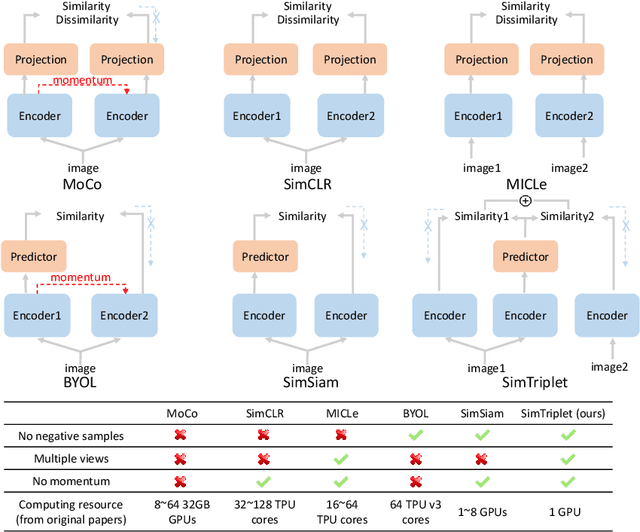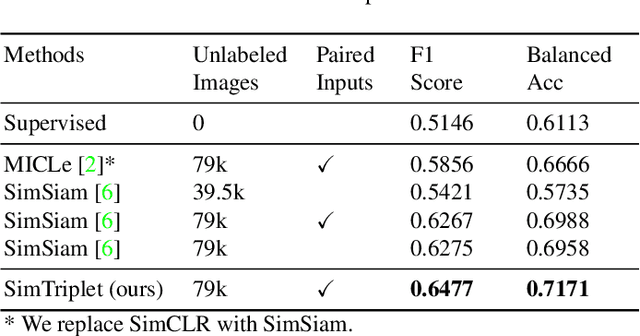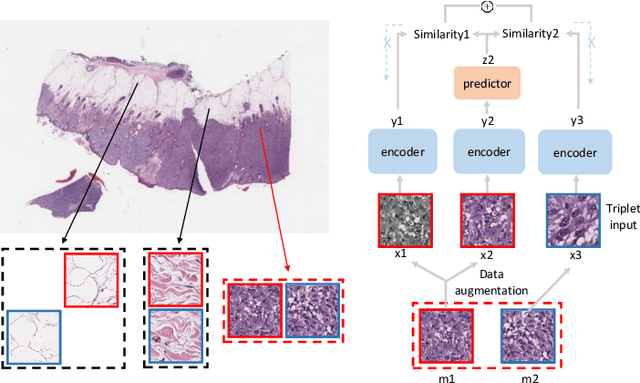Peter C. Louis
SimTriplet: Simple Triplet Representation Learning with a Single GPU
Mar 09, 2021



Abstract:Contrastive learning is a key technique of modern self-supervised learning. The broader accessibility of earlier approaches is hindered by the need of heavy computational resources (e.g., at least 8 GPUs or 32 TPU cores), which accommodate for large-scale negative samples or momentum. The more recent SimSiam approach addresses such key limitations via stop-gradient without momentum encoders. In medical image analysis, multiple instances can be achieved from the same patient or tissue. Inspired by these advances, we propose a simple triplet representation learning (SimTriplet) approach on pathological images. The contribution of the paper is three-fold: (1) The proposed SimTriplet method takes advantage of the multi-view nature of medical images beyond self-augmentation; (2) The method maximizes both intra-sample and inter-sample similarities via triplets from positive pairs, without using negative samples; and (3) The recent mix precision training is employed to advance the training by only using a single GPU with 16GB memory. By learning from 79,000 unlabeled pathological patch images, SimTriplet achieved 10.58% better performance compared with supervised learning. It also achieved 2.13% better performance compared with SimSiam. Our proposed SimTriplet can achieve decent performance using only 1% labeled data. The code and data are available at https://github.com/hrlblab/SimTriple.
WearMask: Fast In-browser Face Mask Detection with Serverless Edge Computing for COVID-19
Jan 04, 2021



Abstract:The COVID-19 epidemic has been a significant healthcare challenge in the United States. According to the Centers for Disease Control and Prevention (CDC), COVID-19 infection is transmitted predominately by respiratory droplets generated when people breathe, talk, cough, or sneeze. Wearing a mask is the primary, effective, and convenient method of blocking 80% of all respiratory infections. Therefore, many face mask detection and monitoring systems have been developed to provide effective supervision for hospitals, airports, publication transportation, sports venues, and retail locations. However, the current commercial face mask detection systems are typically bundled with specific software or hardware, impeding public accessibility. In this paper, we propose an in-browser serverless edge-computing based face mask detection solution, called Web-based efficient AI recognition of masks (WearMask), which can be deployed on any common devices (e.g., cell phones, tablets, computers) that have internet connections using web browsers, without installing any software. The serverless edge-computing design minimizes the extra hardware costs (e.g., specific devices or cloud computing servers). The contribution of the proposed method is to provide a holistic edge-computing framework of integrating (1) deep learning models (YOLO), (2) high-performance neural network inference computing framework (NCNN), and (3) a stack-based virtual machine (WebAssembly). For end-users, our web-based solution has advantages of (1) serverless edge-computing design with minimal device limitation and privacy risk, (2) installation free deployment, (3) low computing requirements, and (4) high detection speed. Our WearMask application has been launched with public access at facemask-detection.com.
 Add to Chrome
Add to Chrome Add to Firefox
Add to Firefox Add to Edge
Add to Edge